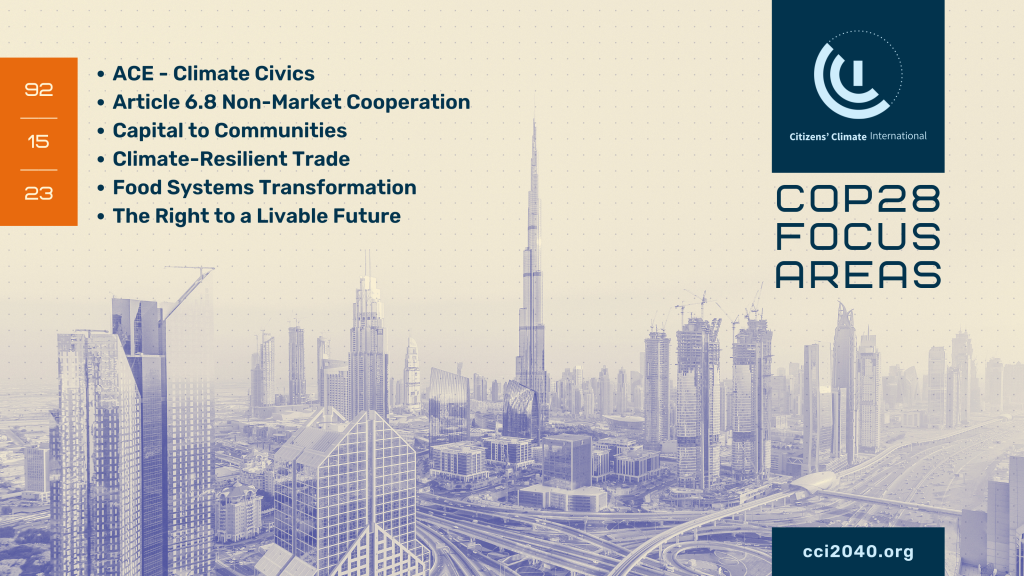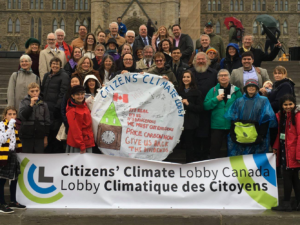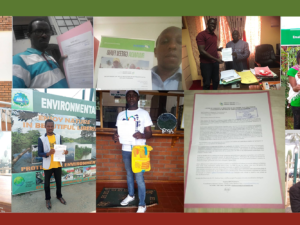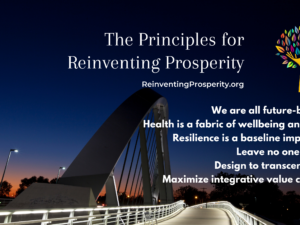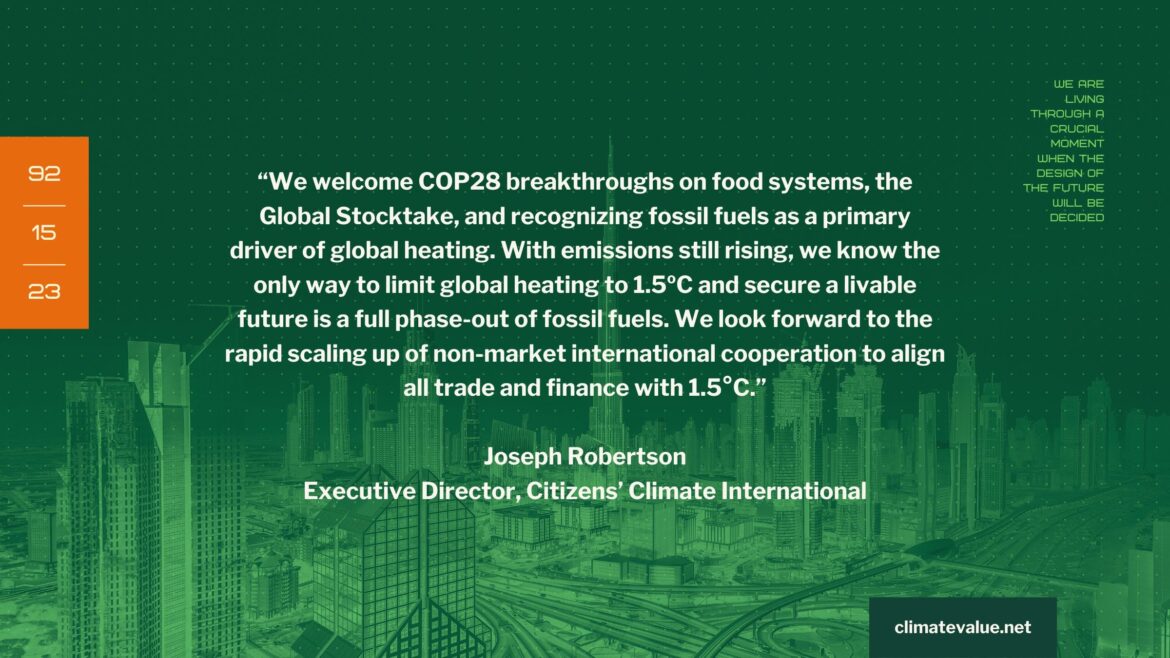
The 28th Conference of the Parties to the United Nations Framework Convention on Climate Change (COP28) delivered some of the vital ingredients of the needed global breakthrough on climate:
- The first Global Stocktake since the Paris Agreement, aimed at assessing progress, identifying urgently needed areas of improvement, and setting in motion the upgrading of national climate plans;
- A new Framework for the Global Goal on Adaptation, aimed at providing needed targets, metrics, action detail, and expanded resources for reducing harm and building resilience against climate shocks;
- A series of food systems advances (more on this below), including language in the formal outcomes of the Global Stocktake and the Global Goal on Adaptation processes.
In all three of these areas, what will count is real-world implementation. The GGA Framework is not itself sufficient to achieve the comprehensive vulnerability reduction and resilience building required to secure a livable future for people, communities, and countries. Action is what follows: How we convert the legal decision text into policy, investments, everyday practice, and outcomes.
Looking ahead to implementation, we need to leverage the GGA Framework to make adaptation investable. As we wrote in the Right to Resilience report, it is critical to bring disparate flows of data together to reveal underlying value, and for small and medium-sized enterprises (SMEs) to play a central role in reducing vulnerability, and delivering data, finance, and other resources and services to end users to build resilience effectively.
SMEs make the right to resilience investable; this wider combination of actors and outcomes will make adaptation investable.
It is also important to recognize that for the first time, the COP has named fossil fuels as a primary cause of global heating and dangerous climate change. While stopping short of a “full phase out”, the final COP decision calls for:
“Transitioning away from fossil fuels in energy systems, in a just, orderly and equitable manner, accelerating action in this critical decade, so as to achieve net zero by 2050 in keeping with the science…”
This is arguably the biggest commitment, but we put the others above it, because this language is flanked by numerous provisions that appear to enable an expansion of some fossil fuel activities and infrastructure. There is no doubt that some countries continue to plan to profit from exporting climate destabilizing pollution, but CCI will continue to report that there is a difference between the transition away from language and the loopholes: Transitioning away from fossil fuels is necessary, according to the science, and established international law; the loopholes are just ideas, that do not have the weight of science, evidence, or law, to substantiate and uphold them.
The transition is law; the loopholes are wishes.
Unfortunately, many nations are not honoring that implicitly understood reality, which has been the legal reality since the Convention was agreed in 1992. Just in the first day after the COP28 concluded, there was a wave of new fossil fuel activities, wrongly treating the loophole language as legal clearance. It is widely expected that numerous countries to ignore international climate law, unless they can be held to account politically and economically.
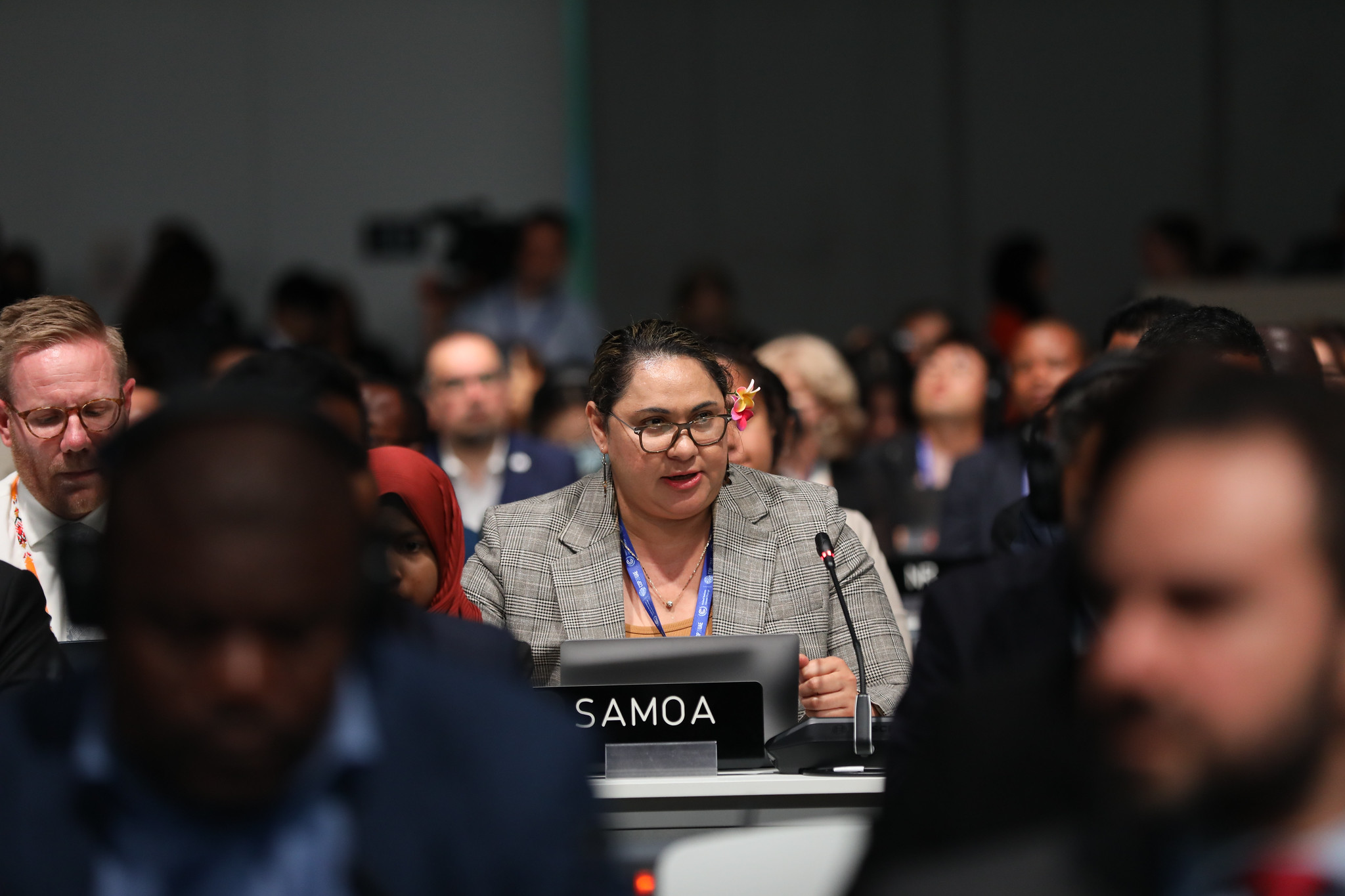
Samoa’s lead negotiator Anne Rasmussen, speaking for the Alliance of Small Island States, just after the COP28 outcome was adopted. Photo: Kiara Worth/UN Climate Change via Flickr,, CC BY-NC-SA
Samoa’s lead negotiator was the first to speak after the COP28 President described the achievement of the UAE Consensus outcome. She noted that the Alliance of Small Island States (AOSIS) was not in the room when the gavel fell, and had not been given adequate opportunity to object to and improve the final text. Given that some AOSIS countries will be erased from existence if sea level rise is not held back, it is urgent that major emissions exporters learn to treat the transition away from fossil fuels as legally, morally, and economically binding.
Article 6.8 non-market cooperation
Non-market approaches may be the key to establishing a clear direction, and universal adherence to the Convention mandate of preventing danger and the Paris goal of limiting global heating to 1.5ºC. A “non-market approach”, as outlined in Paragraph 8 of Article 6 of the Paris Agreement, is essentially a cooperative agreement between two or more countries, to accelerate overall emissions reduction or climate action in other areas, without trading emissions.
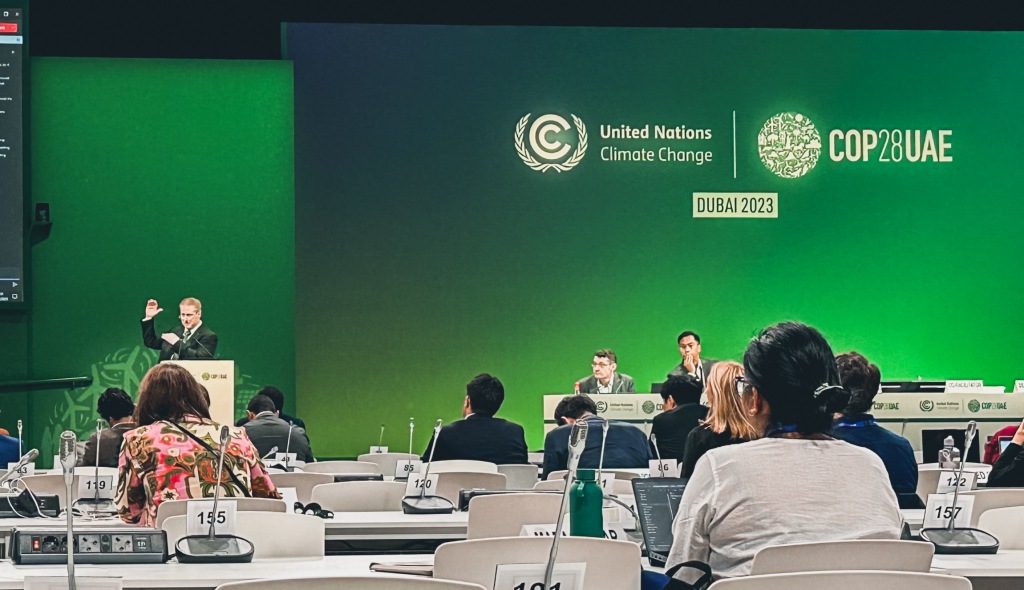
As implementation of Article 6.8 takes off, we look forward to an increasing number of overlapping and interlocking climate-smart trade agreements, through which groups of nations support each other’s contribution to the global climate crisis response, while also advancing economic and human development priorities across the participating countries. Paragraph 32 of the COP28 outcome from the Global Stocktake emphasizes:
“the urgent need to strengthen integrated, holistic and balanced non-market approaches in accordance with Article 6, paragraph 8, of the Paris Agreement, in the context of sustainable development and poverty eradication, in a coordinated and effective manner, including through mitigation, adaptation, finance, technology transfer and capacity-building, as appropriate…”
We find each of the words in Paragraph 32 to have both legal and operational meaning. That NMAs should be “integrated, holistic, and balanced” suggests cooperative arrangements that support whole-economy transformation, including coverage of all global heating emissions, as well as work across conventions. This standard is further established by the Preambular commitment to:
“ensuring the integrity of all ecosystems, including in forests, the ocean, mountains and the cryosphere, and the protection of biodiversity, recognized by some cultures as Mother Earth, and also noting the importance of ‘climate justice’, when taking action to address climate change…”
It is worth noting that while the formal outcome on the Article 6.8 framework does not name most forms of non-market approaches, it does reference previous long lists and negotiations included frequent discussion of fiscal measures, including specifically carbon taxes and border adjustments, as clear modes of international cooperation for accelerating climate action. The UNFCCC is not the space for negotiating fiscal policy, but the growing recognition that International cooperation can be supported by effective pollution pricing is an important step forward on consolidating action toward Paris Agreement goals.
On both cooperation and carbon pricing, we refer readers to the PARIS Principles.
Climate-resilient trade
This commitment to ensure the integrity of all ecosystems is a necessary part of the work of honoring the right to health, and to a clean and healthy environment, and to achieving resilient food systems with sustainable nutrition for all. Ultimately, without the integrity of ecosystems, nature will not be able to play its critical stabilizing role, and both global heating and climate disruption will accelerate.

Climate-resilient trade will eventually be the only kind of trade there is, but there is a big difference between a world where all other trade becomes impossible due to extreme climate breakdown and a world where we choose to make all trade climate-resilient, to ensure we can operate climate-resilient everyday economies. Which end of that spectrum we find ourselves on will have a lot to do with how quickly we transition away from fossil fuels; it will also have a lot to do with how quickly we make the transition to climate-resilient regenerative food systems.
Ultimately, the work on Article 6.8 non-market cooperation, prioritizing investments that lead to alignment of all financial flows with Paris Agreement goals, the transition away from fossil fuels, and support for healthy, sustainable food systems for all, come together to shape a future of climate-resilient trade. Non-market cooperative agreements will effectively serve as climate-smart trade agreements, and bring climate conditionalities into the business of securing national and international economic and security priorities.
We note that paragraph 154 of the Global Stocktake outcome
“Recognizes that Parties should cooperate on promoting a supportive and open international economic system aimed at achieving sustainable economic growth and development in all countries and thus enabling them to better to address the problems of climate change, noting that measures taken to combat climate change, including unilateral ones, should not constitute a means of arbitrary or unjustifiable discrimination or a disguised restriction on international trade…”
This language recognizes legitimate non-protectionist carbon border adjustments and invites all nations to work together to foster open exchange of goods and services aligned with a stable climate, healthy ecosystems, and sustainable development priorities. While far more detail can be added to shape the legal landscape of climate-resilient trade, the need for active negotiation and practical innovation is now clearly recognized.
Food systems
Food systems made historic progress at COP28. 134 nations signed onto the COP28 UAE Declaration on Sustainable Agriculture, Resilient Food Systems, and Climate Action. 25 more nations have signed on since, bringing the total to 159 as of this publication. 2 more non-Party jurisdictions are also endorsing the Declaration.
The Declaration commits nations to integrate food systems and agriculture into their NDCs and NAPs, as well as biodiversity and nature-restoration strategies, to realign public spending and incentives with climate and environment goals linked to food systems, and to:
“scale up and enhance access to all forms of finance from the public, philanthropic and private sectors—including through blended instruments, public-private partnerships and other aligned efforts—to adapt and transform agriculture and food systems to respond to climate change.”
Reference to “blended instruments, public-private partnerships and other aligned efforts” supports institutional and financial innovations like the Good Food Finance Facility—an emerging global co-investment platform for food systems transformation—the Financing the Future of Food (F3) accelerator announced by the COP28 presidency and the RAFT Initiative, through which philanthropic funders will support the shift to regenerative and agroecological production and land-use practices.
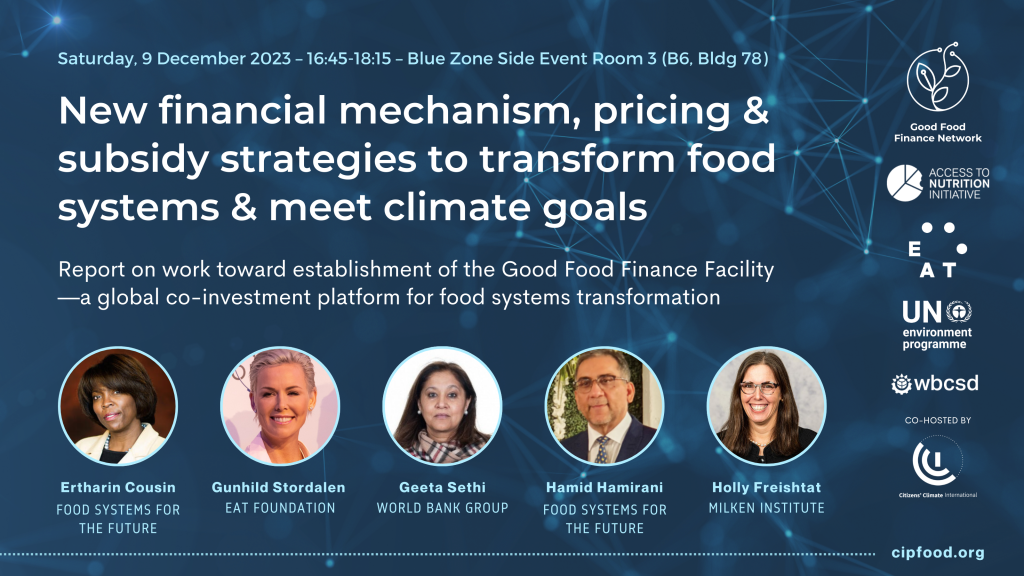
The Declaration is also supported by agreed legal text in the formal COP28 outcomes. Paragraph 63(b) of the Global Stocktake text commits to:
“Attaining climate-resilient food and agricultural production and supply and distribution of food, as well as increasing sustainable and regenerative production and equitable access to adequate food and nutrition for all…”
This same language appears in the outcome of the Global Goal on Adaptation. This means that for the first time, there is clear legal language emerging from the UNFCCC Conference of Parties committing nations to integrate food systems into national climate action plans, public finances, and sustainable development strategies.
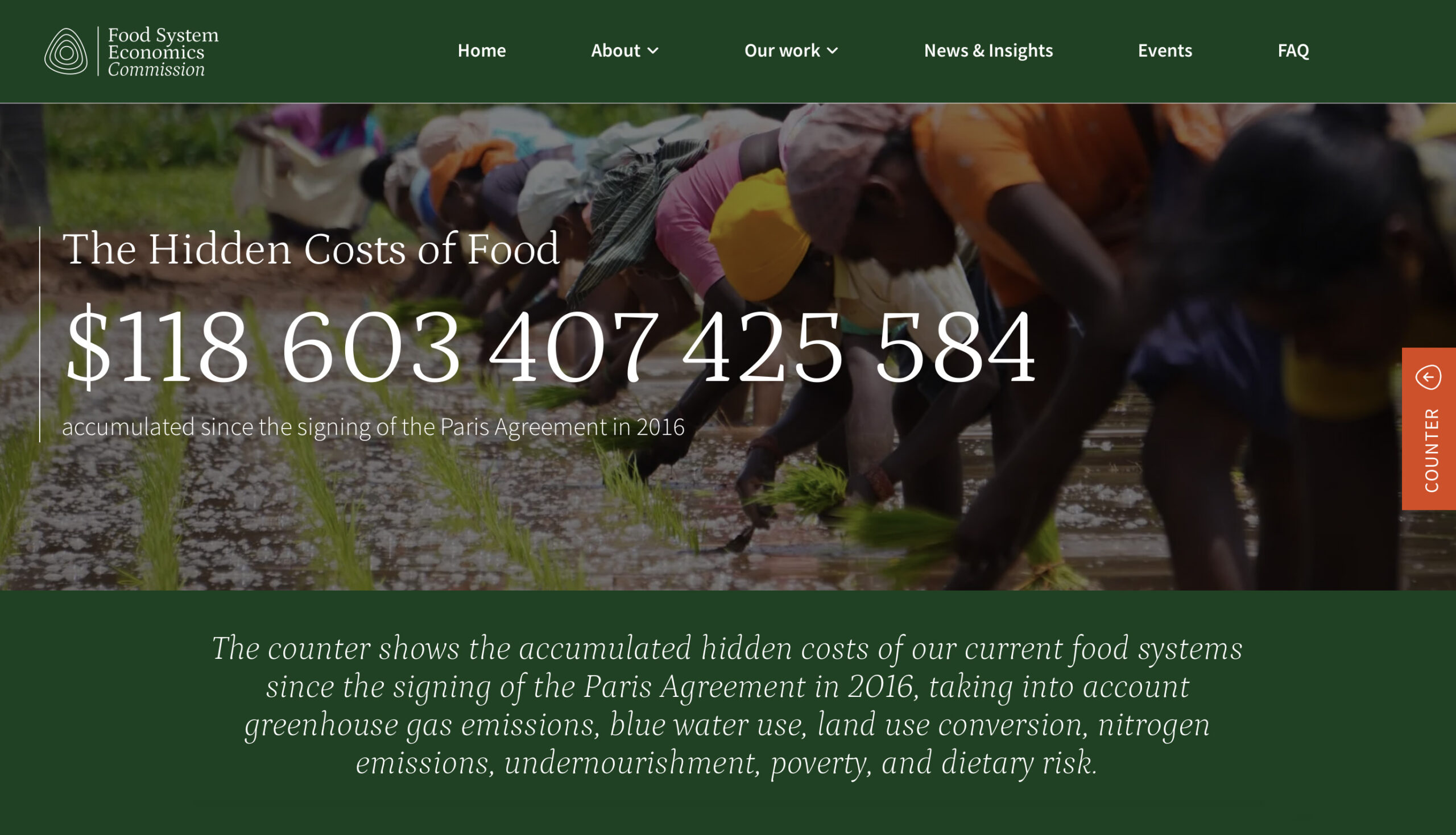
The Food System Economics Commission (FSEC) joined an event in the Food Systems Pavilion at COP28 to describe some of their soon to be published research. They also announced a new ticker on their website tracking the Hidden Costs of Food. At the time of this publication, the updated ticker shows US $118.6 trillion since the Paris Agreement was signed. Image: FSEC.
Food systems are a major driver of cost, risk, and vulnerability—generating global heating emissions, undermining the resilience of soils, ecosystems, and watersheds, and requiring massive inputs of public funding to achieve food security that often does not equate to nutrition security. These costs can be reversed by investing in human health and climate resilience, through better food systems practices and consumption standards.
Citizens’ Climate International signed onto the Non-State Actors Call to Action for Transforming Food Systems for People, Nature, and Climate. In doing so, we cite our work on Reinventing Prosperity, the Right to Resilience, Non-Market Approaches, Capital to Communities, collaborative upgrading of NDCs, and climate civics for enhanced food and finance policy and action. All of these will come together in the Climate Value Exchange and interparliamentary work in 2024.
The Right to a Livable Future
When we take the overall picture of the legal decisions made by the COP28, we have to conclude that the Convention mandate, to prevent danger, and the Paris Agreement goals of (a) limiting global heating to 1.5ºC, (b) achieving adaptation sufficient to reduce vulnerability and achieve sustained resilience, and (c) aligning all financial flows, supersede any attempt at creating loopholes and excuses for pollution.
There is no way to protect the integrity of all ecosystems or to achieve resilient food systems and sustainable nutrition for all, to preserve the cryosphere and to prevent existential danger to low-lying island nations, without phasing out fossil fuels.
- The agreement to transition away from fossil fuels must be understood in this light: we are 31 years into an agreement to prevent dangerous climate destabilization, and meeting that legal obligation is now acknowledged to require a transition away from fossil fuels.
- Language regarding nation-state governments’ obligations on human rights, including the right to health, consolidates this commitment to a livable future, and points to the need to develop energy systems that are truly clean and non-polluting.
- In this first COP since the 2022 agreement of the Global Biodiversity Framework and the 2023 agreement on Conservation and Sustainable Use of Biodiversity Beyond National Jurisdiction (the new ocean treaty), the COP28 legal outcomes effectively commit nations to a recognized, collective and individual stewardship role with respect to the biosphere.
- We reiterate here that investments in nature, resilience, and other non-financial benefits become investable, because small and medium-sized enterprises will deliver action on these benefits in local and regional economies.
Climate Civics
We are very pleased to report that among the important legal decisions emerging from the COP28, there is a general recognition of the vital role played by stakeholders in shaping and sustaining effective climate policy. We applaud Paragraph 9 of the Global Stocktake outcome, which “Reaffirms that sustainable and just solutions to the climate crisis must be founded on meaningful and effective social dialogue and participation of all stakeholders…”
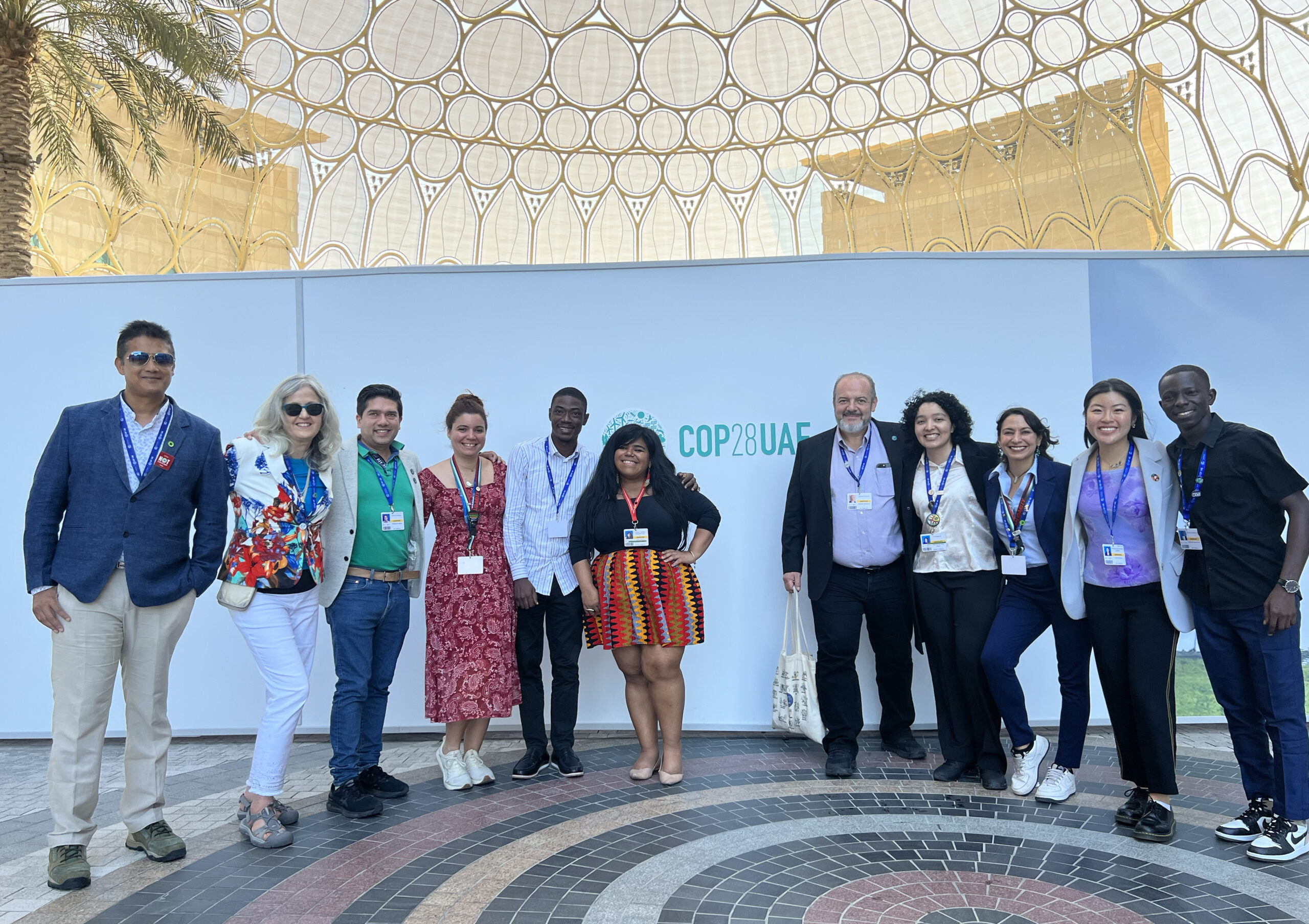
CCI volunteers, staff, and allies, from India, Canada, Latin America, Africa, France, and the United States, representing stakeholders at COP28—part of a larger delegation including more than 20 team members from 15 countries. Photo: CCI.
This may be one of the most critical innovations in the COP28 outcome, as it acknowledges the role of participatory process in the design of policies that will be effective both for mobilizing climate solutions and for fostering inclusive, economy-wide, durable sustainable development and poverty eradication. Recognition of the role of stakeholders, as a cross-cutting priority for all nations, also breathes life into commitments on food systems, the right to health, climate-resilient trade, and the mobilization of expanded and diversified financial resources.
As a climate civics organization, Citizens’ Climate International wishes to emphasize that the Action for Climate Empowerment agenda—rooted in Article 6 of the Convention and Article 12 of the Paris Agreement—goes beyond public access to information, awareness, and participation, to include operational elements of successful climate-resilient development. Education and training to ensure capacity on the ground, and international cooperation to create wider opportunity for investment in climate solutions, are critical elements of the ACE agenda.
Through support for engagement with stakeholders, the COP28 outcomes open the door to an unprecedented expansion of empowered, effective, game-changing participatory process. It will be up to jurisdictions and institutions at all scales to make this open door into real-world implementation that benefits everyone.
Capital to Communities
Our 2022 Reinventing Prosperity Report focused on the Capital to Communities approach to participatory design of climate finance arrangements. This approach is now effectively endorsed by the COP28 outcome call for “meaningful and effective social dialogue and participation of all stakeholders” in the design of climate policy and resource mobilization.
We recognize in the formal outcome on the Loss and Damage Fund, the commitment to
- “make arrangements to allow for the effective participation of observers in its meetings”;
- “establish consultative forums to engage and communicate with … a wide range of stakeholders, including representatives of civil society organizations, environmental and development non-governmental organizations, trade unions, Indigenous Peoples, youth, women, climate-induced migrants, industries and sectors impacted by climate change, community-based organizations, bilateral and multilateral development cooperation agencies, technical and research agencies, the private sector and governments”;
- and to “develop mechanisms to promote the input and participation of stakeholders, including private sector actors, civil society organizations and the groups most vulnerable to the adverse effects of climate change, including women, youth and Indigenous Peoples…”
These commitments build the Capital to Communities participatory approach into insight-gathering, policy design, and fund allocation processes, and signal an understanding that addressing needs and priorities at the human scale requires local, national, and supranational opportunities for engagement of stakeholders.
- In 2024, CCI and the Climate Value Exchange aim to support Capital to Communities participatory interventions to deliver higher ambition, more locally rooted and relevant climate investment strategies, and better outcomes on a faster timeline.
- The existing CCI network of citizen volunteer policy advocates, spread over 76 countries on 6 continents, can support this expanded civic engagement.
- The Engage4Climate Toolkit for structuring local stakeholder meetings and engagement events can also play a role.
- And, we see both procedural and monitoring-related innovations at multilateral finance institutions as providing a vast landscape of opportunity to open the civic space and create more informed, more effective climate finance arrangements that can reach more people in more diverse situations.
The journey to Baku and Belém
The community of nations is now embarking on a new phase in the post-Paris journey toward a climate-resilient future. By 2025, all nations should submit upgraded national climate action strategies, starting with NDCs for the 2025 to 2035 period. Whether delivered before, during or after the COP29 in Baku, all nations should design and initiate implementation of:
- Economy-wide national climate action plans (ENCAPs) including mitigation-focused NDCs, NAPs, and other nature, health, food-focused and resilience strategies, to align both domestic resource mobilization and international finance and trade with a 1.5ºC future;
- Supported by non-market cooperative agreements in line with Article 6.8 of the Paris Agreement, and serving the Article 7 goal of a world with reduced vulnerability and enhanced resilience for all, the Article 2 goal of aligned financial flows, and the Article 12 goal of public information, transparency, training, and engagement;
- Integrating non-financial metrics into financial decisions, to better reveal climate value—the practical and experiential value of a more stable climate, enhanced resilience, sustainable practices, and a healthy, pollution-free system of finance, industry, and trade;
- Safeguarding ecological integrity across all sectors and areas of policy and investment, recognizing that actions far removed in time and geography can have devastating downstream impacts, and investing to give upstream actors enhanced economic opportunity for operating sustainably.

While many nations continue to see rapid wealth generation from fossil fuels as a national priority, we urge all nations—especially those most dependent on fossil fuel revenues—to recognize the transition away from fossil fuels as:
- An ethical imperative, necessary for meeting the fundamental duty of honoring the rights of people, communities, nature, and future generations;
- An economic imperative, aligned with the best possible future of sustainable, resilience-building, shared prosperity;
- A legal imperative, agreed as the collective way forward for implementation of the 1992 Convention and the Paris Agreement.
The true opportunity inherent in the UAE Consensus comes from recognizing and investing in the value of ecosystem integrity, climate stability, human health, reduced vulnerability, enhanced resilience, and the fiscal stability benefits of all of these. To activate the best-case climate value economy of the future, nations must treat the transition away from fossil fuels as a legal, moral, and investable operational imperative.
For more about CCI activities around COP28, go to cci2040.org
